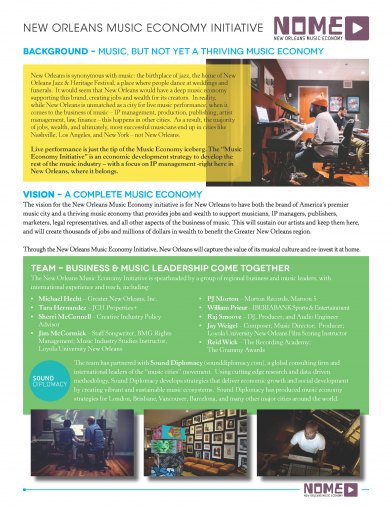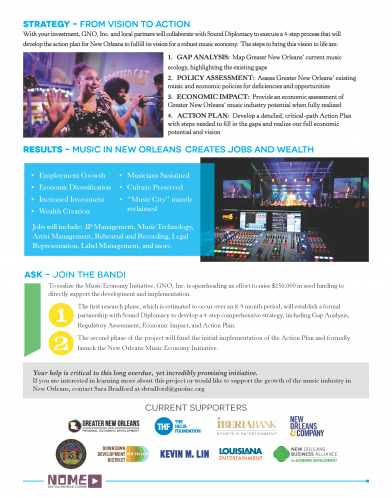Back in 1985, an economic development committee within the Chamber of Commerce (as it was called then; now there’s NOLA Business Alliance, GNO, Inc., and more) created a non-profit organization, the New Orleans Music & Entertainment Association, aka NOME) specifically to nurture and to develop the New Orleans music industry.
Back in those ancient days, it was recognized—as it is today—that there are thousands of talented musicians toiling away at their art and craft, but they were working for peanuts, and there was a severe lack of a music industry infrastructure that could support and create businesses that could help musicians prosper, and sustain these music businesses too.
My point is that developing our music industry has been a dream and a vision for well over three decades.
 I’ve read time and again the headline “Can New Orleans Become Another Nashville?”. Hey, I may have written it myself before I became more knowledgeable about the music industry. Now that I have, I don’t believe that’s the way New Orleans should—or could ever—go. This city isn’t Nashville. The signature genres of music this city is known for and for which it’s become world-famous aren’t country music (which has a huge audience worldwide). Iur signature genres that have made our perception as a music city are jazz, R&B, funk and hip-hop, and their iterations. Except for hip-hop, these genres enjoy a relatively small piece of the music consumer pie. Nashville developed into a music biz center because of country music and because the music industry established itself there around country music.
I’ve read time and again the headline “Can New Orleans Become Another Nashville?”. Hey, I may have written it myself before I became more knowledgeable about the music industry. Now that I have, I don’t believe that’s the way New Orleans should—or could ever—go. This city isn’t Nashville. The signature genres of music this city is known for and for which it’s become world-famous aren’t country music (which has a huge audience worldwide). Iur signature genres that have made our perception as a music city are jazz, R&B, funk and hip-hop, and their iterations. Except for hip-hop, these genres enjoy a relatively small piece of the music consumer pie. Nashville developed into a music biz center because of country music and because the music industry established itself there around country music.  Songwriters created a wealth of product that they could introduce to country music stars, who were also based in Nashville.
Songwriters created a wealth of product that they could introduce to country music stars, who were also based in Nashville.
Austin would be a more comparable model, but New Orleans isn’t Austin either, except for maybe rivaling it in its claim for being the “Live Music Capital of the World.” Hey, Austin claimed that title without verification, and consumers believed it (it’s called hype, people, something the music biz is really, really good at). But Austin also jumped on music industry development 30 years ago as well, with the creation of South by Southwest. That alone put Austin on the map, music industry-wise, and has now expanded to include tech, film and education.
Yes, it takes decades to actually create critical mass of industry that makes it real and not a a wishful thinker’s pipe dream. Businesses have to be created, or attracted to the city. Music business education (for entrepreneurs and musicians alike) has to be an integral part of this equation (the Loyola Music Industry Studies program is a huge step in that direction and should be a serious part of any plan for development. The city needs to revamp its zoning and noise ordinances to stimulate live music performances and to cater more to musicians’ needs and pocketbooks. The film, television, gaming and commercial music sectors are key to a thriving industry as well. Ditto training publishers, managers, tech (streaming is everything now, not hard product), publishers, songwriters, tech, tech and more tech.
This is not to say that New Orleans can’t create a thriving music industry. It can, but first we need to determine what New Orleans’ music industry is going to be. It’s not going to be another Nashville or Austin. New Orleans has an outstanding and unique reputation and a brand that must be capitalized upon. It has musical strengths, but tremendous weaknesses, that will influence how our potential music industry “thrives.” We need to identify those, first and foremost.
GNO, Inc. started a music business development entity entitled NOME (sound familiar?) and wisely commissioned a study to determine what New Orleans’ resources and potential are, and a resultant plan, based on that information, to develop the local music industry. There’s $250,000 dedicated to this effort, $150,000 of which is allocated to the study to be performed by a Europe-based consultant, Sound Diplomacy, that’s conducting the year-long research. The rest of the money is tagged for “implementation,” the meaning of which, hopefully, will be revealed at the conclusion of the research.
Personally, I don’t think $100K will do much of anything, but by the end of 2019, perhaps we’ll have a few answers we can ponder and that can actually be implemented with a multi-year strategy and goals. Oh yes: and who will be responsible for making sure the steps are being taken to achieve the stated goals? Huge, and important. As I said, developing the critical mass that will be a music industry takes a long time.
I am always one who is hopeful, yet skeptical—having seen what’s transpired over the past 35 years—that New Orleans can get its music industry act together.




